The top court said that it is settled law that a scheme cannot be held to be constitutionally suspect, merely because it was based on an electoral promise.
The Supreme Court on Tuesday upheld a scheme of the then ruling AIADMK government in Tamil Nadu granting a waiver of outstanding crop loans, medium-term (agriculture) loans, and long-term (farm sector) loans issued to small and marginal farmers.
The top court said that it is settled law that a scheme cannot be held to be constitutionally suspect, merely because it was based on an electoral promise.
A bench of Justices DY Chandrachud and AS Bopanna set aside an order of April 4, 2017, of the Madurai bench of the Madras High Court, saying that it had erred in its view that because the scheme was in pursuance of an electoral promise, it is constitutionally suspect.
“The Scheme in issue was introduced in pursuance of an electoral promise made by the then party in power in Tamil Nadu. The High Court seems to have been of the view that because the scheme was in pursuance of an electoral promise, it is constitutionally suspect. This view was made on an assumption that no study must have been conducted before the electoral promise was made. It is settled law that a scheme cannot be held to be constitutionally suspect merely because it was based on an electoral promise,” the bench said.
It said that a scheme can be held suspect only within the contours of the Constitution, irrespective of the intent with which the scheme was introduced.
“The scheme propounded by the State of Tamil Nadu passes musters against the constitutional challenge. The High Court has erred in holding otherwise. During the pendency of the proceedings the State has granted a broader coverage, based on its assessment of the situation,” it said.
The Tamil Nadu government had issued a scheme in May 2016, granting a waiver of outstanding crop loans, medium-term (agriculture) loans, and long-term (farm sector) loans issued to small and marginal farmers.
The guidelines for the scheme provided for the classification of farmers as small and marginal, the extent of landholding as mentioned in the landholding register and loan register at the time of sanction of the agricultural loan shall be taken into consideration.
“As for the definition of ‘small farmer’ and ‘marginal farmer’, it provides that ‘small farmer’ means a farmer who holds land of 2.5 acres to 5 acres and ‘marginal farmer’ means a farmer who holds land up to 2.5 acres.
Subsequently, a circular was issued by the Registrar of Cooperative Societies on July 1, 2016, providing further guidelines for implementation of the scheme,� the bench noted.
The state government has raised a preliminary contention that the Court cannot review the scheme since it is a fiscal policy decision of the State.
The bench said that the judicially evolved two-pronged test to determine the validity of the law vis-a-vis Article 14 of the Constitution refers to the objective of the law because the ‘policy’ behind the law is never completely insulated from judicial attention.
“However, it is settled law that the Court cannot interfere with the soundness and wisdom of a policy. A policy is subject to judicial review on the limited grounds of compliance with the fundamental rights and other provisions of the Constitution,” it said, adding that it is also settled that the Courts would show a higher degree of deference to matters concerning economic policy, compared to other matters of civil and political rights.
The bench said that economic policies broadly comprise policies on taxation, expenditure, and allocation, and the State and its agencies often endeavour to make economically feasible decisions.
“The implementation of every policy of the State involves expenditure. Merely because the policy involves the expenditure of funds, it cannot be termed as an economic policy. The core feature of the policy and the targeted area needs to be determined to identify the nature of the policy,” it said.
The bench said that the impugned loan waiver scheme is, in essence, a social policy in pursuance of the Directive Principles of State Policy, introduced with an object to eliminate inequality in status, income, and facilities.
“The loan waiver scheme is also in pursuance of the Directive Principles of State Policy. In view of the observations in the scheme cannot be held to breach Article 14 since it does not impose a burden but affords a benefit,” it said.
The top court said that the equality code in Article 14 of the constitution prescribes substantive and not formal equality and classification is reasonable when the twin tests based on an intelligible differentia are fulfilled.
“Therefore, the reasons that seem to have guided the State of Tamil Nadu for the formulation of this scheme are two-fold: (i) The small and marginal farmers have faced greater harm due to the erratic climate conditions in view of the limited technology and capital that they possess; and (ii) The state seeks to provide maximum benefits with the minimum fund,” it said.
The bench said that therefore, the courts must show a greater degree of deference to cases where the rational nexus test is applied.
“Since the classification in the impugned scheme is based neither on the grounds in Article 15 nor on the �innate and core trait’ of an individual, it cannot be struck down on the alleged grounds of under-inclusiveness and over-inclusiveness,” the bench said.
Source: Read Full Article


